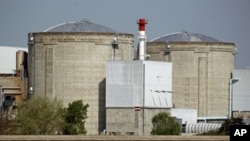European concerns about the safety of nuclear power were notched up this week after Japan raised its assessment of the crisis at its Fukushima Daiichi nuclear power plant to the highest level. Advocates argue nuclear energy is critical, though, in the fight against global warming.
The March accident at Japan's Fukushima Daiichi nuclear power plant has rekindled a long simmering debate in Europe over whether nuclear power - with its expense, its waste and especially its risk - is worth it. European jitters grew this week after Japan increased the severity level of the Fukushima accident to level 7, which is on par with the world's worst nuclear catastrophe, the 1986 Chernobyl catastrophe in Ukraine.
Nowhere is this debate more relevant than in France, a major exporter of nuclear technology and the world's second-largest user of nuclear energy, after the United States. The country's 58 nuclear power plants generate about 80 percent of the nation's electricity.
The Fukushima accident has not changed the French government's support of nuclear energy.
Speaking during a recent visit to Japan, French President Nicolas Sarkozy said the problem was more about making sure nuclear power was safe. If nuclear plants were scrapped, he asked, what energy would replace them?
For its part, the European Union has announced a review of the region's 143 nuclear reactors. European Commission President Jose Manuel Barroso said the so-called stress tests must be completed by the year's end.
"The terrible events in Japan remind us that while we have very different views on situations in the European Union regarding nuclear energy, we must be united on the issue of nuclear safety," said Barroso. "We must ensure the highest nuclear safety standards are respected."
Are nuclear power stations safe? That question was posed to Bernard Barre, a consultant for Paris-based Areva, one of the world's leading constructors of nuclear reactors.
"There is no answer to that blunt question," said Barre. "Are we doing what's needed to make nuclear power safe? And the answer is indeed, when moving to Generation III, we are doing a lot to increase the safety of nuclear plants."
He said Generation III reactors incorporate the latest technology. In theory, they are designed to be able to cope with threats like terrorist attacks and natural disasters, like the tsunami and earthquake that hit Fukushima, which is an earlier generation reactor.
Christian Taillebois, head of communications at Brussels-based Foratum, representing Europe's nuclear industry, also notes that the current Generation II nuclear reactors in Europe periodically undergo safety tests and upgrades.
"Our feeling is there is no need for an immediate reaction in Europe, because European plants are safe, no doubt," said Taillebois. "But we still think the industry has to learn all the lessons from the Japanese accident."
Anti-nuclear activists disagree. Sophia Majnoni is in charge of nuclear issues at the environmental group Greenpeace France. She said, "The first lesson that Europe should learn from the Fukushima accident is the fact that safe nuclear does not exist and that an accident can happen everywhere around the world - on any reactor."
Majnoni also pointed out that the newest Generation III nuclear reactors have yet to go into service, so nobody knows just how safe they will be.
European governments are deeply divided over nuclear power, while public opposition has grown since the Fukushima accident. While some Eastern countries continue to champion nuclear energy, Germany, Switzerland and Italy are among those announcing suspensions or moratoriums on building or extending the lives of nuclear plants.
Even in pro-nuclear France, the government likely will close an aging nuclear plant in the eastern part of the country following anti-nuclear demonstrations.
Stephen Tindale, a climate change analyst at the London-based Center for European Reform, said, "There is a very big question about whether Europe will, both the institutions, the commission and more importantly the national governments, continue to develop nuclear. That is the enormous question now."
Perhaps the most powerful argument for nuclear energy right now is its role in reducing European dependency on oil and gas imports - and its role in the fight against global warming.
"If we want to meet our target in Europe regarding the reduction of CO2 emissions, we need for sure nuclear," said Taillebois. "Nuclear is not the only solution, but nuclear is part of the solution."
But French energy consultant Bernard Laponche argues the risks posed by nuclear power, and the waste it generates, are just too great.
"You have the risk of accidents, the [same level] of Fukushima, but maybe not the same. And you have the problem of the waste and the problem of proliferation. I think that because of these three reasons we have to go out of nuclear, at least with the actual and foreseen techniques."
Other analysts, like Tindale, believe Europe has no choice, but to continue with nuclear power until less risky clean-energy alternatives are fully developed and the region slashes its energy use.
What is clear is that Europe's nuclear debate is far from over.
Europe's Nuclear Debate at Forefront After Japan Disaster
- By Lisa Bryant




